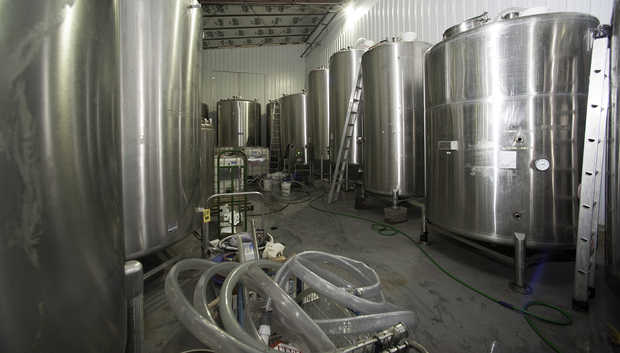Wednesday
It took my mother and me two days to fly from New England to Tennessee after storms canceled flights out of LaGuardia Monday evening. Other than the unpleasant experience of paying for a New York hotel, however, the trip was a success. Among other highlights, I got to sample “Mainiac” apple cider, which my Maine cousins the Rickers are currently making. Harry Ricker informs me that sales are still climbing and that they placed high in a national tasting contest.
My cousins invested a million dollars in their apple cider operation—the Rickers never do anything halfway—and the highly mechanized operation is a lot different than that mentioned by John Keats and Robert Frost.
Here’s the reference to cider from Keats’s “Ode to Autumn.” Keats’s life, like the year, is waning or oozing away. But rather than pity himself, he marvels at how precious and vivid everything is. The lethargic (or sickly) speaker lounges around, appreciating the touch of the wind, the smell of poppies, and the slow oozings of the cider press:
Who hath not seen thee [Autumn] oft amid thy store?
Sometimes whoever seeks abroad may find
Thee sitting careless on a granary floor,
Thy hair soft-lifted by the winnowing wind;
Or on a half-reap’d furrow sound asleep,
Drows’d with the fume of poppies, while thy hook
Spares the next swath and all its twined flowers:
And sometimes like a gleaner thou dost keep|
Steady thy laden head across a brook;
Or by a cider-press, with patient look,
Thou watchest the last oozings hours by hours.
The process moves at a considerably more rapid pace today. The cider also has to be treated.
I asked my cousin-by-marriage Jeff Timberlake, who also runs the farm, what he thought of the Frost reference to cider in “Apple Picking”:
There were ten thousand thousand fruit to touch,
Cherish in hand, lift down, and not let fall.
For all
That struck the earth,
No matter if not bruised or spiked with stubble,
Went surely to the cider-apple heap
As of no worth.
Jeff said that, while they do indeed use a lesser grade of apple for cider, they don’t rely on apples that have hit the ground. But their machinery is such that they can remove bruises from the apples that they do use. Jeff also said they have been planting new trees that yield a better cider apple.
The machinery is impressive. I can’t begin to describe all the intricate devices they have or the complex chemistry involved. Jeff says that the single greatest challenge is ensuring that every can of cider tastes like every other can of cider.
The operation made the poem’s images of a farmer reaching out and plucking apples seem a long-ago relic from the past:
My long two-pointed ladder’s sticking through a tree
Toward heaven still,
And there’s a barrel that I didn’t fill
Beside it, and there may be two or three
Apples I didn’t pick upon some bough.
But I am done with apple-picking now.
And further on:
My instep arch not only keeps the ache,
It keeps the pressure of a ladder-round.
I feel the ladder sway as the boughs bend.
And I keep hearing from the cellar bin
The rumbling sound
Of load on load of apples coming in.
Not everything has changed. Jeff tells me that the farm still uses ladders for the tall trees and one still hears during harvest season the “rumbling sound of load on load of apples coming in.” But the ladders now are easier on the instep, being made of aluminum, not wood. They are also used less and less as the farm turns to dwarf trees and trees espaliered on wires. And then there is that processing plant, which looks like a science fiction setting.
Farming, in other words, has changed drastically. But that being said, it’s also still the case that a single hailstorm can wipe out a year’s crop. For all their technological control, farmers are still vulnerable when it comes to the weather.


